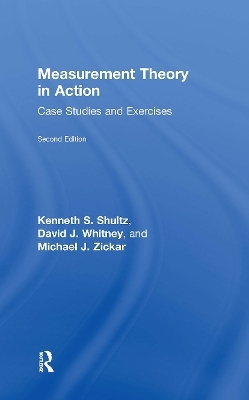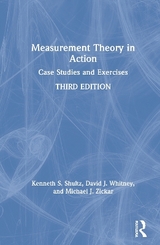
Measurement Theory in Action
Routledge (Verlag)
978-0-415-63362-8 (ISBN)
- Titel erscheint in neuer Auflage
- Artikel merken
Updated throughout to reflect recent changes in the field, the new edition also features:
--A new co-author, Michael Zickar, who updated the advanced topics and added the new module on generalizability theory (Module 22).
-Expanded coverage of reliability (Modules 5 & 6) and exploratory and confirmatory factor analysis (Modules 18 & 19) to help readers interpret results presented in journal articles.
-Expanded Web Resources, Instructors will now find: suggested answers to the book’s questions and exercises; detailed worked solutions to the exercises; and PowerPoint slides. Students and instructors can access the SPSS data sets; additional exercises; the glossary; and website references that are helpful in understanding psychometric concepts.
Part 1 provides an introduction to measurement theory and specs for scaling and testing and a review of statistics. Part 2 then progresses through practical issues related to text reliability, validation, meta-analysis and bias. Part 3 reviews practical issues related to text construction such as the development of measures of maximal performance, CTT item analysis, test scoring, developing measures of typical performance, and issues related to response styles and guessing. The book concludes with advanced topics such as multiple regression, exploratory and confirmatory factor analysis, item response theory (IRT), IRT applications including computer adaptive testing and differential item functioning, and generalizability theory.
Ideal as a text for any psychometrics, testing and measurement, or multivariate statistics course taught in psychology, education, marketing and management, professional researchers in need of a quick refresher on applying measurement theory will also find this an invaluable reference.
Kenneth S. Shultz is Professor of Psychology at California State University, San Bernardino. David J. Whitney is Professor and Department Chair of psychology at California State University, Long Beach. Michael J. Zickar is Professor and Department Chair of Psychology at Bowling Green State University in Ohio.
Part 1: Introduction 1. Introduction and Overview 2. Statistics Review for Psychological Measurement 3. Psychological Scaling 4. Test Preparation and Specification Part 2: Reliability, Validity, and Test Bias 5. Reliability Overview: Classical Test Theory 6. Estimating Reliability 7. Content Validity 8. Criterion-Related Validation 9. Construct Validity 10. Validity Generalization and Psychometric Meta-Analysis 11. Test Bias, Unfairness, and Equivalence Part 3: Practical Issues in Test Construction 12. Developing Tests of Maximal Performance 13. Classical Test Theory Item Analysis 14. Scoring Tests 15. Developing Measures of Typical Performance 16. Response Bias Part 4: Advanced Topics 17. Combining Predictors using Multiple Regression 18. Exploratory Factor Analysis 19. Confirmatory Factor Analysis 20. Item Response Theory 21. Applications of Item Response Theory: Computer Adaptive Testing and Differential Item Functioning 22. Generalizability Theory
| Zusatzinfo | 23 Tables, black and white; 16 Line drawings, black and white; 5 Halftones, black and white; 21 Illustrations, black and white |
|---|---|
| Verlagsort | London |
| Sprache | englisch |
| Maße | 152 x 229 mm |
| Gewicht | 725 g |
| Themenwelt | Geisteswissenschaften ► Psychologie ► Klinische Psychologie |
| Geisteswissenschaften ► Psychologie ► Test in der Psychologie | |
| Sozialwissenschaften ► Pädagogik | |
| ISBN-10 | 0-415-63362-1 / 0415633621 |
| ISBN-13 | 978-0-415-63362-8 / 9780415633628 |
| Zustand | Neuware |
| Haben Sie eine Frage zum Produkt? |
aus dem Bereich



